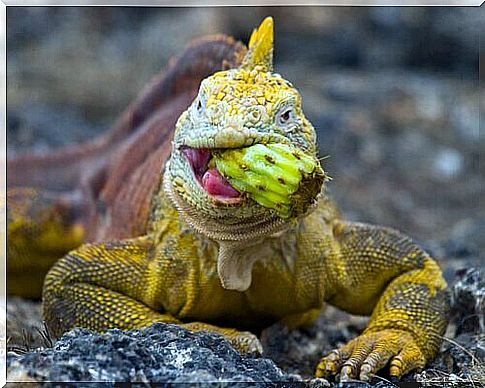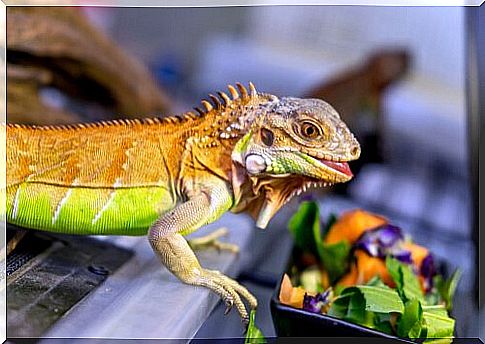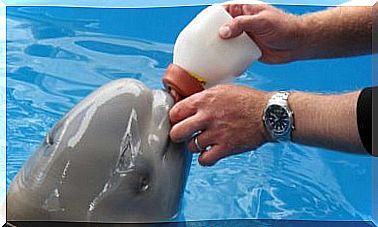Lack Of Vitamins And Calcium In Iguanas

Having a pet requires a lot of responsibility and care. In the case of exotic species, we must pay more attention to their special needs. So, in this article, we’re going to talk about the lack of vitamins and calcium in iguanas, and how to reverse this process.
Lack of vitamins and calcium in iguanas?
In recent times, iguanas have become popular as pets. So we need to learn a lot about them.
One of the main problems that these reptiles suffer is the lack of certain nutrients due to an unbalanced diet.
Veterinarians have noticed that a large part of the iguana population has a disease called osteodystrophy, or metabolic bone disease. This disease is caused by a lack of calcium in the body.
This problem usually appears in the first few months after the iguana arrives at home. Especially if it’s a young specimen. Bones undergo progressive decalcification.
This in turn produces a mandible deformity, which is shorter than the upper jaw. This is reflected in the edges, which have a more robust appearance.
Another symptom of osteoarthritis is an increased risk of fractures in the front and back legs, lameness, lumps in the extremities and even paralysis.
In cases of paralysis, the iguana is constipated and has a swollen abdomen. This is because the animal cannot properly eliminate feces and gases.
Causes of lack of vitamin
This pathology can be caused by several factors. Among them, the little contact with sunlight and ultraviolet rays that activate vitamin D.
Through this mechanism, the animal absorbs calcium from the intestine. This also happens when the iguana spends a few hours under the fluorescent light installed in fish tanks.

Unfortunately, many iguanas do not receive adequate food. Also, some animals live in conditions that are far from ideal.
This does not mean that owners do something on purpose. But sometimes lack of information is very dangerous.
How to avoid or reduce lack of vitamins and calcium in iguanas?
Firstly, it is very important to consult a veterinarian to indicate the proper food for your pet. In fact, this recommendation must be followed regardless of your animal’s species.
If you’ve recently adopted an iguana, you’ll have to be very knowledgeable about all of its needs.
That is, not just food, but also in terms of exposure to sunlight. After all, don’t forget that this is a cold-blooded reptile that needs a heat source to raise its body temperature.
Some veterinarians will recommend a calcium or vitamin supplement. In that case, we must follow the prescription exactly.
In addition, you should always offer your pet a variety of quality food.
Typically, the weekly dose of vitamins for a young iguana – up to two years old – is twice a week.
In turn, for an adult iguana, this dose should only be given once a week. You may have read that there are some reptile vitamin aerosols that are applied to the skin. However, it is not proven that they are effective and can solve this serious health problem.
Balanced eating: the best prevention
When iguanas lack vitamins or calcium, it is best to offer a balanced diet. After all, these reptiles, now domestic, are herbivores. That is, they do not eat insects or animals of any kind.
The iguanas’ diet is composed of 70% vegetables, 15% fruits and the remaining 15% special rations. Feed is sold at veterinary clinics and pet stores.
Finally, we recommend that among the vegetables you offer, there should always be those with the most vitamins and calcium.
Among them, include: lettuce, beets, chard, cabbage and parsley. Also, to a lesser extent, you can offer cucumbers, tomatoes and zucchini. In turn, the most suitable fruits are: strawberry, banana, apple, pear and melon.








